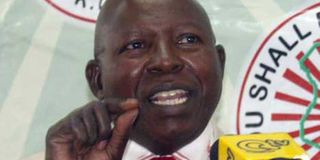Why Catholic medics should talk with their bishops

Dr Stephen K. Kanranja Chairman of the Kenya Catholic Doctors Association. No specific claims are being made about contamination of these vaccines so that they can be quickly addressed for the benefit of these same Kenyans. PHOTO | NJUGI NGUGI | NATION MEDIA GROUP
What you need to know:
- The resurrection of these claims suggests that the bishops distrust the entire public health infrastructure, and risks destroying disease prevention gains made over so many decades.
- The credibility of these others is not based on their qualifications or training, but on the positions they hold in the public imagination.
- They are allowed to trash professionals, with members of the public cheering them on, even when all available knowledge contradicts their claims.
Earlier this past week, Catholic bishops came out railing against the polio vaccination campaign planned to begin this weekend.
They demanded that the campaign be stopped until “joint testing” was carried out, so that they can “assure Kenyans of the safety of the vaccines”.
No specific claims are being made about contamination of these vaccines so that they can be quickly addressed for the benefit of these same Kenyans.
In March last year, Catholic Archbishop John Cardinal Njue raised similar concerns about the tetanus vaccine, leading to a protracted “testing” that proved that none of the randomly selected samples of the vaccine were tainted, as claimed by the bishops.
Throughout the testing, only three surreptitiously acquired and tested vials showed evidence of “tainting”, raising questions as to how they were acquired and treated before testing by the bishops.
This “row” continued until early this year when it appeared to have been put to rest.
The resurrection of these claims suggests that the bishops distrust the entire public health infrastructure, and risks destroying disease prevention gains made over so many decades.
To my mind, a dangerous trend has taken root in this country, building upon the previously noted tendency of Kenyans to dismiss professionals in favour of others considered to be more credible.
The credibility of these others is not based on their qualifications or training, but on the positions they hold in the public imagination.
They are allowed to trash professionals, with members of the public cheering them on, even when all available knowledge contradicts their claims.
For the past few years, health professionals have borne the brunt of this.
Their professional opinions have been dismissed on the flimsiest of grounds, their blueprints shelved, and their position in society lowered so much that they have lately been seen as tradesmen and artisans.
And yet when we seek their professional services, we demand the highest quality service, and are quick to run to the media to complain about their “lack of professionalism” and to demand that they be disciplined or charged in court.
As someone once said, choices have consequences.
We can choose to destroy the health profession in Kenya and live with the resultant anarchy.
Or we can choose to listen critically to professionals, interrogate them, and ultimately make decisions respecting their position.
Many in this country have asked those of us in the health services to “engage” the bishops and address their concerns before proceeding with these important public health work.
They can be sure that many of us have tried, and on this I have even faulted the government for bending over backwards to accommodate even the quirkiest of demands from disparate groups.
It is safe to conclude that we probably do not know the real problem behind these escalating unproved claims of vaccine contamination.
In my view, Catholic bishops will only be swayed by Catholic faithful, including professionals involved in these vaccination campaigns and in vaccine research and development.
Let these professionals who feel that our children are being unnecessarily exposed to preventable risks talk with these bishops and discuss their concerns.
Perhaps the bishops will listen to them more than the government and public health professionals that they seem to distrust so much!
Prof Lukoye Atwoli, Associate Professor of Psychiatry and Dean Moi University School of Medicine [email protected]




